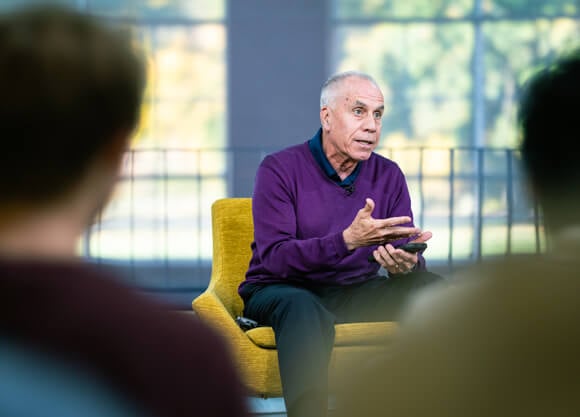
Aspiring Bobcat journalists learn from MLB reporter, Hall of Famer Tim Kurkjian
November 06, 2024

November 06, 2024

On October 24, Kurkjian traveled to the Mount Carmel Campus to sit down with good friend and former ESPN colleague, Quinnipiac professor of journalism Nick Pietruszkiewicz, for a live recording of episode three of “What’s Your Story?”
The new Quinnipiac video series, hosted by Pietruszkiewicz, brings some of the biggest names in sports journalism and communications on campus for wide-ranging conversation on the past, present and future of the industry. The first two shows featured NBC Sports’ Jimmy Roberts and ESPN SportsCenter anchor Matt Barrie.
As an editor at ESPN, Pietruszkiewicz worked with Kurkjian on several notable projects. At Quinnipiac, Pietruszkiewicz discussed Kurkjian’s talent as a sports historian evidenced by the likes of his deep dive story on the magical play of Willie Mays; his memorable and unique profile of MLB umpire “Cowboy Joe” West; and his epic Tim Kurkjian’s Baseball Fix, for which he told a new story for 100 consecutive days during the pandemic’s baseball shutdown.
Kurkjian captivated a packed Bobcat audience with his energetic personality, encyclopedic knowledge and tremendous recall of the game of baseball and its players, past and present, matched by his ability to spin a great story based on his experiences. Kurkjian applied that ability in answer to Pietruszkiewicz’s query about how he found out he was to be inducted in the Baseball Hall of Fame.
“Let me just tell you how this happened,” said Kurkjian. “I get a phone call that I’d been elected to go in the Hall of Fame. I was at the grocery store named Harris Teeter, dragging a rotisserie chicken through the self-serve scanner, when I got the call from Jack O’Connell of the Baseball Writers’ [Association of America], and I literally started to cry in the middle of the grocery store.”
Kurkjian recounted next receiving a congratulatory phone call from Johnny Bench, “…the greatest catcher of all time;” then meeting up with Bench in Cooperstown, New York, during the powerful, emotional weekend of his Hall of Fame induction.
Kurkjian shared how Bench advised him to be in the moment, saying, “…remember where you are, how you got here and how many people helped get you here.”
During their hour-long talk at Quinnipiac, Kurkjian and Pietruszkiewicz walked a rapt audience through many highlights of Kurkjian’s prolific sports journalism career.
Immediately after earning his bachelor’s in journalism from the University of Maryland in 1978, Kurkjian began filing his first stories as a writer with the Washington Star that same year. He went on to cover the Texas Rangers beat for the Dallas Morning News, the Baltimore Orioles for The Baltimore Sun, then rose to become senior writer for Sports Illustrated for eight years.
Kurkjian told the students he had to work at becoming a good journalist and writer. He described the grind involved with cutting his teeth among more experienced reporters, and the respect and trust he gained as he developed his ability to deliver deeply informed, accurate and memorable stories. In 1998, at age 40, recognition he’d earned during years of sports journalism put Kurkjian in front of the camera for the first time on ESPN, as a reporter for Baseball Tonight and a senior writer.
Kurkjian bantered with his Bobcat audience, took many student questions and provided some key takeaways.
As a journalist, Kurkjian said he challenges himself, every day, to be better.
“This is a competition. The goal is to do the best you can every day, and it doesn’t matter if you’re in the Hall of Fame or not. It doesn’t matter if you’ve been on "Baseball Tonight" for 27 years. All that matters is today’s game. Did you do it properly? Did you do it well? If you don’t, then you lost. It’s a win-lose situation,” said Kurkjian.
He described his passion for preparing extensively for interviews, sharpened by his curiosity and developed by engaging in a discussion with his subjects, rather than questions and answers.
“You have to be curious about the person you’re interviewing in order to understand where your story is going,” said Kurkjian. “Get into a conversation with this person, instead of an interview process. If somehow you can morph this into ‘we are having a conversation about baseball’ that’s when you know your story’s going to be great.”
Quinnipiac Today is your source for what's happening throughout #BobcatNation. Sign up for our weekly email newsletter to be among the first to know about news, events and members of our Bobcat family who are making a positive difference in our world.
Sign Up Now